ROBERT WILLIAMS BUCHANAN (1841 - 1901)
|
ROBERT WILLIAMS BUCHANAN (1841 - 1901) |
|
|
|
|
|
|
|
|
{Ballad Stories of the Affections. From the Scandinavian 1866}
32
SIR SKAMMEL dwelt far north in Thy, The one was Ebbe Skammelson, Ebbe he saddled his charger gray, He wooed the proud May Adelaide, But Ebbe stept to the high chamber 33 ‘Think of me, Adelaide, my May, And Ebbe in the Court o’ the King And Ebbe in the Court o’ the King Peter, his brother, built a boat, It was young Peter Skammelson ‘Hail unto thee, fair Adelaide! 34 ‘How should I plight my troth to thee, ‘I sware to wait for eight long years Then answered Peter Skammelson, Outspake young Peter’s old mother ‘Ebbe serves in the Court o’ the King, |
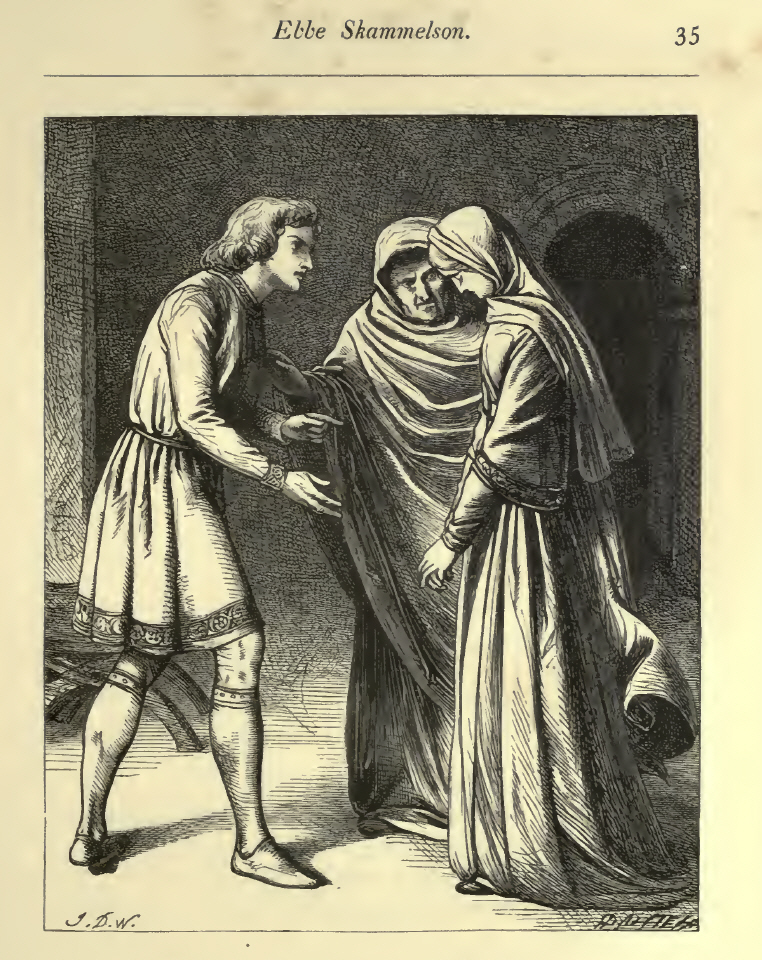 |
|
‘Far better marry Peter, my son, ‘Hearken, young Peter Skammelson,— 36 It was Sir Peter’s old mothèr Up stood the bonnie Adelaide, So gaily for the marriage feast They brewed the wine and white, white mead, It was young Ebbe Skammelson It was young Ebbe Skammelson 37 ‘Methought that all my stone chamber ‘In sooth? then, Ebbe Skammelson, ‘But if in dreams thy stone chamber It was Sir Ebbe Skammelson It was Sir Ebbe Skammelson It was Sir Ebbe Skammelson 38 Up to his father’s castle red ‘Hearken, hearken, thou little page, ‘Here gather the ladies o’ the North, ‘Braw hae they decked thy brither’s bride, Out came Ebbe’s sisters twain, And it was Ebbe’s sisters twain 39 A bright gold bracelet unto each One sadly bade him tarry there, His father and mother asked him in He turned his horse around about, She led him to a cushioned stool, He poured the wine for the bonnie bride, 40 It was Sir Ebbe Skammelson Late in the quiet gloaming hour, They followed her unto her bower, It was Sir Ebbe Skammelson ‘All the love-troth I gave to thee, ‘I sought not thee my mother to be, 41 ‘Yet hearken, hearken, Adelaide,— ‘And if thou didst thy brother slay, It was Sir Ebbe Skammelson He followed her unto her bower, In at the door Sir Ebbe stept, With glittering sword he cut her down, 42 And underneath his cloak he hid ‘Hearken, O Peter Skammelson,— It was young Peter Skammelson ‘Hearken, O Ebbe Skammelson, ‘Hearken, O Ebbe Skammelson, |
|||
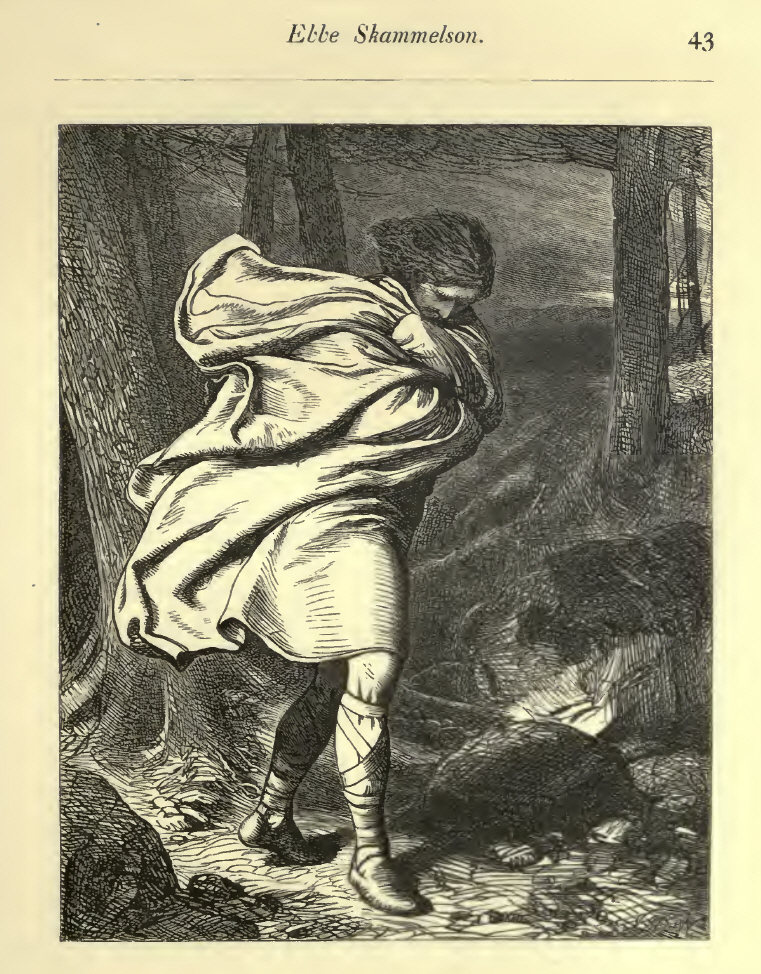 |
|||
|
‘Stand up, thou Peter Skammelson, It was Sir Ebbe Skammelson 44 Woe, woe, there was in hall and bower, His father had a grievous wound, His brother Peter Skammelson From such a bloody bridal day
45
I. SIR PETER and Sir Oluf at table sit; ‘O hearken, Sir Oluf, boon comrade mine: ‘And wherefore marry a housewife cold ‘Whenever upon my horn I play ‘Whenever upon my horn I play ‘I know a maiden in this countree ‘I stake my horse—’tis a goodly steed— ‘I stake my necklace of pearls of price, 46
II. Late in the eve, in the gloaming shade, Deftly he blew in his horn of gold: Long listens Maid Mettelil eagerly: Up and down swell her breasts of snow: ‘If I thither by moonlight go,
III. Maid Mettelil, and her hound so small, Maid Mettelil, in a mantle blue, She knocks at the door with her white, white hand— |
|||
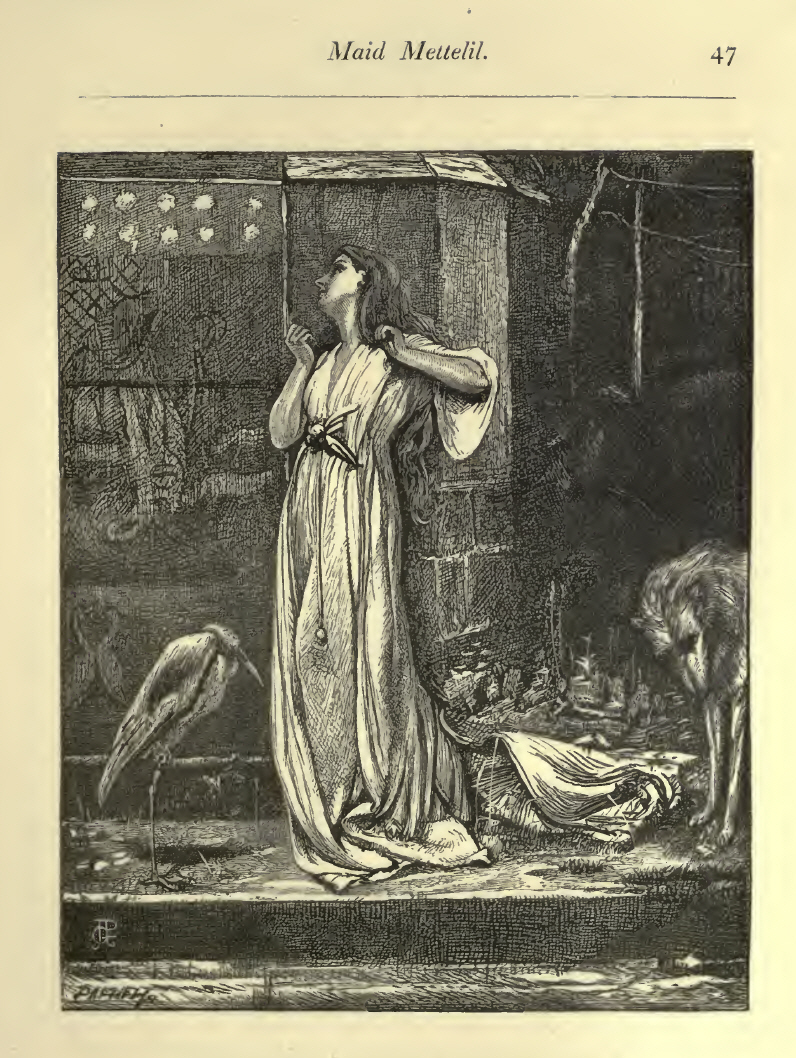 |
|
‘None have I summoned unto my bower; ‘Open the door, Sir Oluf, to me— 48 ‘Heart-sick art thou with my minstrelsie? ‘Gladly would I welcome thee here, ‘And if I am grown so dear to thee, ‘Rise up, Sir Oluf, and open the door— “’And fall the dews on thy forehead fair? ‘And if thou wilt not open the door, ‘The moon is clear and the white stars burn— ‘The moon shines clearly overhead,
IV. Maid Mettelil, and her hound so small, To the castle gate they come full soon; 49 ‘Welcome, Maid Mettelil, my bride! ‘Out in the greenwood grove, I ween, ‘Plucking the blossoms, the red and white, ‘Yonder have I been wandering, ‘No nightingale hast thou heard to-night, ‘Hearken, O Mettelil, unto me: ‘Now have I lost my steed, I ween,
V. And no man knew she had been so light, Sir Peter wanders so gloomy and grim; 50 VI. May this to the young a lesson prove,—
THERE dwelt by my chamber window The other birds were silent ‘Curst be the owl!’ I muttered, It was my trusty huntsman 51 It was my trusty huntsman But now the summer is over Among the leafless branches I think of the old owl often,
52
SIR OLUF, the knight, full wide hath rid, Lightly the elfin companie There dances four, there dances five— The Elf King’s daughter is featest of all: ‘Welcome, Herr Oluf! welcome to thee! ‘I dare not dance, and I must away, ‘Listen, Herr Oluf: dance with me— |
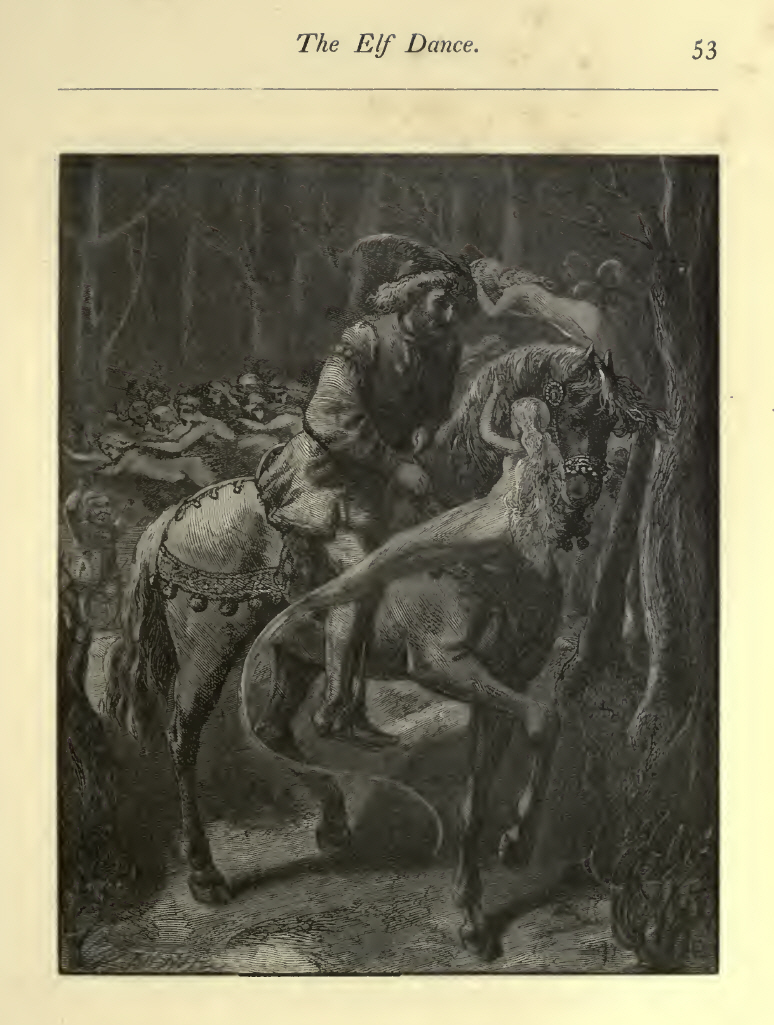 |
|
‘I dare not dance, and I must away, ‘Listen, Herr Oluf, listen to me— 54 ‘A silken sark, so white and fine, ‘I dare not dance, and I must away, ‘Listen Herr Oluf: dance with me— ‘A helmet of gold were fine to see; ‘And wilt thou not tread in the dance with me? His shoulders she strikes with her fingers white: She lifts Sir Oluf upon his steed: Sir Oluf rides—he rides in fear: ‘Listen, Herr Oluf, my own bonnie knight: ‘Well may my cheeks be ghastly white,— ‘Listen, Herr Oluf, and woe betide! 55 ‘Say I am gone to the wood hard by, Early at dawn, when it was day, They drank of mead and they drank of wine: ‘Herr Oluf hath gone to the wood hard by, She lifted up the curtains red— Early at dawn, when the sun was hie, Sir Oluf the knight, and his bonnie bride,
56
IT was the young Herr Carl Nor Mass nor even-song First step in his sisters,— ‘And say, my son, Herr Carl, ‘No sickness of the flesh 57 ‘If little Maid Eline ‘Her father have I asked, Herr Carl arose in bed, It was the young Herr Carl, Bright gems are on his head, Up peeps the fair Eline, 58 Answered the serving-maids— It was the fair Eline, ‘O little Maid Christine, ‘Many a merry tale It was the young Herr Carl But when the Mass was sung, 59 They ride across the fields, Then in the dusky eve Then sware the fair Eline— Then sware the fair Eline— Into her sleeping room He doffed his robe of white, 60 Then marvelled fair Eline, ‘O tell me, fair Eline, ‘No man in all the world, ‘And if thou lovest him— ‘And if thou lovest him— |
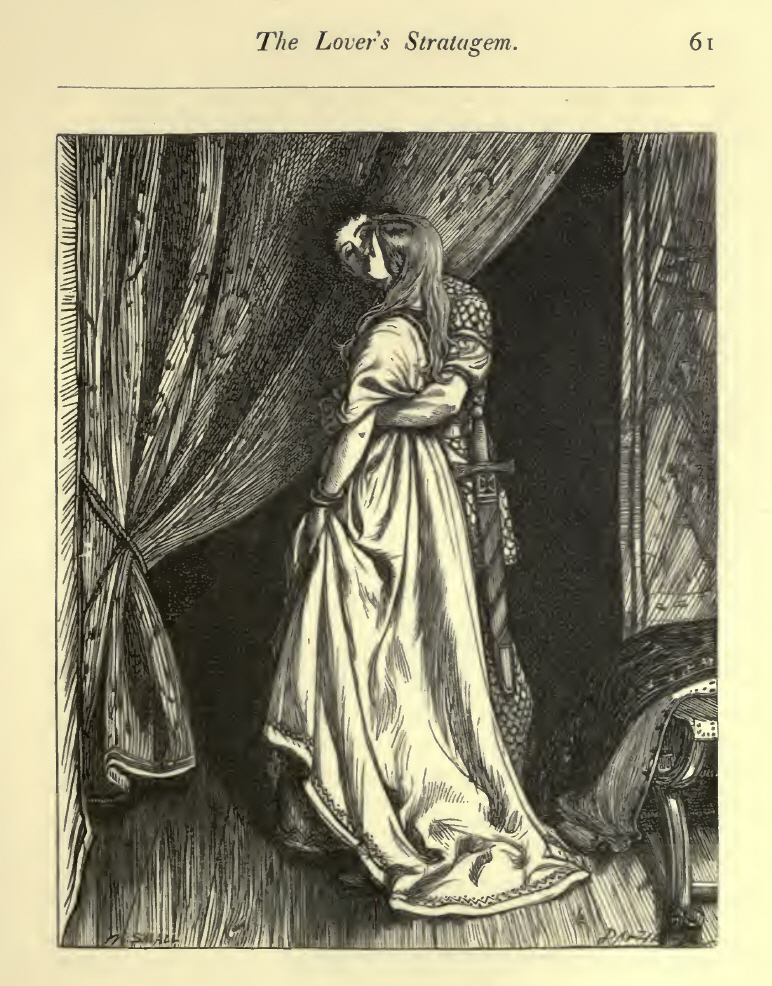 |
|
‘O hearken, young Herr Carl, Upon her throbbing heart 62 He kissed her on the cheek, ‘And what care I for cloister?’ ’Tis merry in the hall—
63
‘O SIT thee down, my bonnie groom, ‘O stake thy hat, my bonnie groom, When first upon the table board ‘O sit thee down, my bonnie groom, ‘O stake thy tunic, bonnie groom, 64 When next upon the table board ‘O sit thee down, my bonnie groom, ‘O stake thy hose, my bonnie groom, When next upon the table board ‘O hearken, hearken, bonnie groom; ‘Thy silver-handled knives of price 65 ‘O hearken, hearken, bonnie groom; ‘Thy sarks and stockings, slken-sewn, ‘O hearken, hearken, bonnie groom; ‘Thy snow-white horse and saddle eke ‘O hearken, hearken, bonnie groom; |
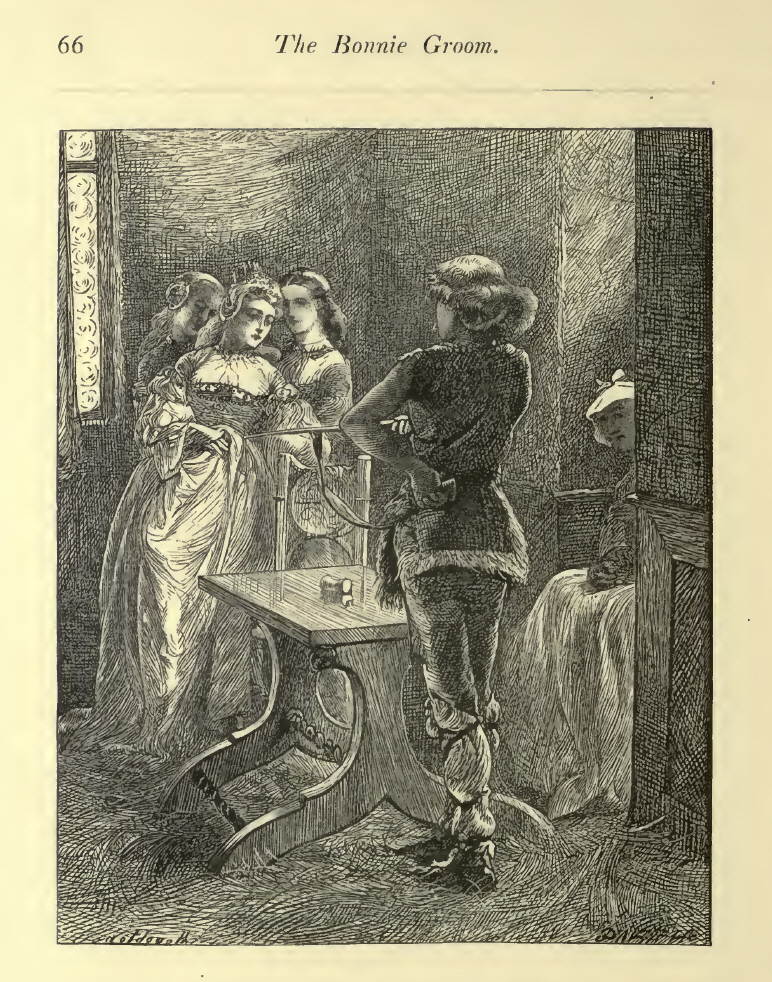 |
|
‘Thy castle and the wealth therein The maiden rends her golden hair, 67 The bonnie groom stands up in court, ‘And yet am I no stable groom, ‘Art thou a bonnie prince indeed, _____
Ballad Stories of the Affections continued or back to Ballad Stories of the Affections - Contents
|
|
|
|
|
|
|